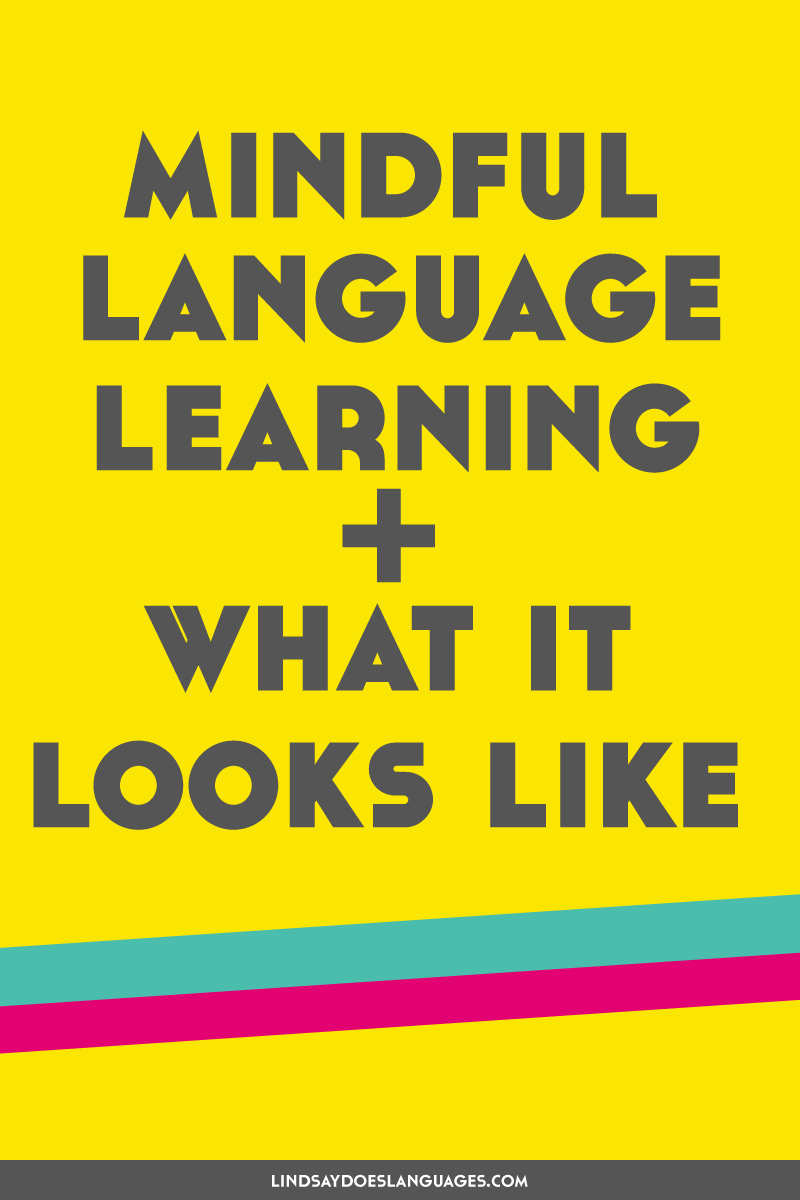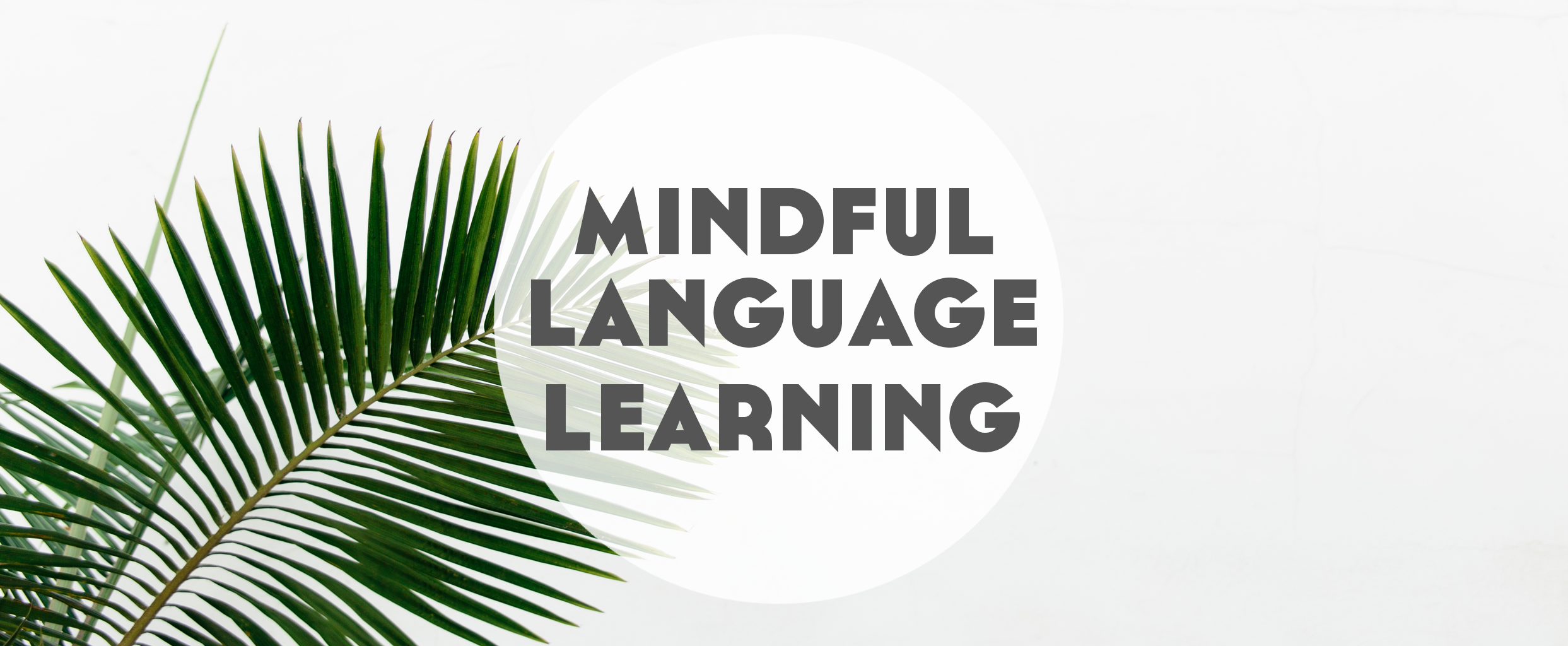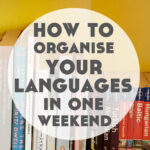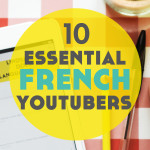June 25th, 2021
Mindful Language Learning (+ What It Looks Like)
Ever wondered if language learning can ever be less stressful? It can be. Mindful language learning is possible. Here’s what it looks like.

It’s easy to think language learning is a thing that happens in a vacuum separate from the rest of life for those you see online seemingly effortlessly speaking multiple languages.
So that means you have to hustle to learn a language, right? That it has to be more intense than an abs workout on YouTube. That you have to rush it and get fluent fast. Not true.
There’s a growing number of language teachers, coaches and learners out there that take a more mindful approach. Less grind, more kind.
(I was trying to say “less hustle, more *something*” but couldn’t think of something appropriate that rhymed with hustle. So we’ll settle for less grind, more kind.)
Here’s a few teachers and coaches who work with a more mindful approach that I love:
Jessica Tefenkgi Ruelle of Frency Sunny Side – Jessica does a wonderful job of blending mindfulness with language learning for French learners. Her membership Bulle de Français opens a couple of times a year and gives you the chance to really connect on a deeper level with the language.
Emily Richardson of Tea With Emily – Emily learnt Portuguese in the messy year that was 2020 with pretty much just lots of language exchange. Emily has a refreshing approach to language learning and is releasing her guide to language exchange very soon.
Maria Ortega Garcia of Embodied Spanish – Maria spoke at Women In Language 2020 as one of our first dream teams with Jessica of French Sunny Side! Maria’s Spanish membership gives you the chance each month to immerse yourself in Spanish through poetry, journalling and more.
Chesline Pierre Paul – Ches is always a joy to talk to and has a real holistic approach to their language coaching options. If you’re (re)learning a heritage language, Ches’ coaching is well worth checking out.
Silvia Perrone of Italearn – Silvia is a great Italian teacher who blends creative writing and stories with your Italian learning. Well worth taking a look if you’re learning Italian.
Danae Florou of AlphaBeta Greek – Danae covers lots with her monthly membership for Greek learners, and encourages you to write and speak for yourself with the prompts provided.
In short, mindful language learning is about considering yourself more during the process, rather than rushing and racing to “the end”. It works because, spoiler alert, there is no “end” to learning a language.
Plus, the more you can connect on a deeper level with both yourself and the language you’re learning, the better.
What is mindfulness?
Kind of a buzzword, huh?
It’s easy to get lost at this stage and give up trying to figure out exactly what ‘mindfulness’ means.
And honestly, everyone will have a different answer, which I guess is part of mindfulness to begin with when we consider what are often cited as the 3 aspects of mindfulness:
Being aware
Being nonjudgemental
Being nonreactive
You’ll see these worded differently in different places, but the essence is the same:
You’re present and aware of what’s happening and how you’re feeling
You’re not judging yourself for feeling a certain way
You’re not instantly reacting, instead you’re sitting with those feelings and that awareness
To be honest, we could sum this all up in the words of Daði Freyr – Think about things.
How does this fit with language learning?
Here’s how language learning traditionally happens.
We buy a book/course/app/lessons with a tutor to teach us.
We work through the resource diligently, in order, to a schedule.
Then, either…
We finish. By the time we’re done, we expect to be able to use the language confidently…we can’t. We blame ourselves.
Or…
We get stuck (and maybe even give up) when the resource suddenly throws 3 layers of new stuff at us in one chapter. We still blame ourselves.
So rather than ending there, mindful language learning is about applying a layer of thought to what we’re doing.
Try asking yourself these questions right now about where you’re at with the language you’re learning:
>> Am I enjoying myself?
>> Am I feeling stressed or confused or frustrated?
>> Do I find myself blaming myself when I can’t do what the resource “expects” me to?
>> How do I feel before doing some language learning?
>> How do I feel during doing some language learning?
>> How do I feel after doing some language learning?
Related: How to Learn a Language with Duolingo (+ Actually Remember It)
Does this involve a big shift from what I do already?
In theory, no. Not unless you want it to.
The easiest way to embrace more mindful language learning is to start by asking yourself the questions above each time you do some language learning.
Start thinking about when you feel excited and lit up by what you’re doing vs when you feel the complete opposite.
There’s always something else you could be doing or using instead – even for lesser studied languages.
If it’s not working, change it.
Otherwise, simply consider your own honest feelings about what you’re up to.
Related: Now What? What to Do After Duolingo: Intermediate Language Learning Strategies
So it’s not all about meditation and journalling and candles then?
Nope!
Although, if you start exploring mindful language learning and find yourself interested in the topic of mindfulness, there’s plenty of ways to bring that into your language learning too.
You could try meditating, journalling, repeating mantras or simply reading up on mindfulness in the language you’re learning.
There’s also some great options out there for language specific mindful language learning. Try investigating some of the language teachers and coaches I shared above to start!
A Chat with Jessica of French Sunny Side!
To celebrate Bulle de Français, I asked Jessica a few questions about mindfulness too and how it combines with language learning for her. Here’s what she had to say…
Does mindful language learning mean I’m only allowed to meditate in French/[insert language here]?
Mindfulness doesn’t mean meditation only. Mindfulness is simply the practice of being present, with all our senses, to what is.
Mindful language learning can involve formal meditation in French or in the language you’re learning.
Meditation is in fact a beautiful way to prepare your brain to be more focused, to improve your memory, as well as to tame self-doubt, which tends to show up a lot when we express ourselves in a language we don’t master.
But there’s much more to mindful learning.
In fact, think of any activities that prompt you to be more present with your language whilst forgetting about the result. Those are mindful language learning activities. Here are a few examples:
Doing introspective journaling to express your thoughts and emotions in French.
Reading in flow, without looking up every word you don’t know.
Practicing gratitude.
Noticing all that is around you, and name it in French.
Walking in nature and describing what you see in French.
Using mantras and affirmations in French.
Creative writing.
Doodling & art therapy in French, without trying to make something pretty.
Dancing to French music as if nobody is watching, to liberate your emotions and your expression.
How did you first start to incorporate mindfulness into your language learning?
For a long time, I was disconnected from Italian, which is a language I learned to speak as a child. When I was studying it at university, it all became very serious: linguistics, semantics, classic literature. I liked learning about it, but it wasn’t my language anymore. So after I graduated, I put my Italian books on the shelves, and I almost never spoke Italian again.
Until many years later after a trip to Rome, where just being there with the language, with all my senses, made me fall crazy in love with Italian.
The sensations of the wind on my skin on Piazza Navona, the gelato on my tastebuds, the beautiful sounds in my ears, the smell of focaccia and the music, the smiles, the sounds of the Vespas.
This was my first aha moment. I realized that to keep this beautiful relationship with the language, I had to study it in a way that allowed my heart, body and soul to be connected to it.
So my first step was to start introspective journaling in Italian. I stopped caring about making mistakes, even if I could see them in front of me.
I brought joy, acceptance and compassion on the language adventure, and never looked back.
What does your own language learning look like?
I’m currently learning Spanish, and it’s a part of my « restore and refresh » routine on Sunday.
I have a very busy life as a homeschooling mom with 2 children, one of which is 4 months old, and a full-time business to run.
I am also an introvert and what makes me feel good is to spend time by myself, doing things that replenish me: journaling, meditating, reading, listening to music, watching videos on self-development topics, drawing and painting.
So that’s exactly what my language learning looks like. It’s just 2 -3 hours and that’s enough.
It’s my little moment of self-care. I don’t expect to be « C1 by 2022 », I just focus on the pleasure of using Spanish to get my dose of well-being.
How do you work with mindful language learners in your membership Bulle de Français?
To create Bulle de Français, I imagined what my ideal language program would be.
So, in Bulle de Français, the members are invited to forget about performing in French. We don’t talk about the language, we talk in the language, around topics that bring more consciousness, more happiness to their lives.
It’s an immersive experience, that blends French learning with self-care, so that your French practice feels like a beautiful parenthesis, a moment that is just for you.
Every month, they receive a beautiful interactive PDF magazine that I create around a specific topic. This month, for instance, was about « L’art de ne rien faire » (the art of doing nothing).
Inside, they find some texts in progressive French, which means that I use a lot of cognate words & synonyms so that the meaning can be understood from context. I also add the English translations of a few more difficult words directly in the text to keep the learners in the flow. The accompanying audios allow to enjoy French sounds and also help to develop awareness of the pronunciation.
A guided meditation puts them in the mood to learn. The journaling prompts are there to invite the learners to reflect upon themselves and express their thoughts and emotions directly in French. There are also songs or poems, mantras & art therapy activities, as well as an online community in which the members , « les Bulleurs », discuss and encourage each other.
There’s also group coaching and 1:1 coaching available in the VIP plan, which helps create a stronger sense of community, support and accountability.
As you can see, In Bulle de Français, the French language is not the star of the show. The learners are.
And that’s what makes this experience both unique and effective. Because when you reflect on your own story in the language you learn, you are engaged with every part of yourself. You are connected.
What are your 3 tips towards more mindful language learning?
1. Set a reasonable goal, that honors your intention, your personality and your lifestyle. This is very important, otherwise you will wear yourself out, you will have difficulties staying consistent and you won’t feel very good about it. If you’re an introvert, for instance, choose activities that allow you to use your superpowers as an introvert rather than doing group conversations classes. Remember that «getting out of the comfort zone » doesn’t mean throwing yourself into discomfort either.
2. Follow the sun. Do the things you love, directly in your target language. Don’t delay falling in love with the language. Don’t wait until you’ve learned all the words and studied all the tenses. Yes, that means you have permission to ditch everything that doesn’t feel good. Follow the joy today, every day, in every moment. You’ll never get bored, you’ll never lose your motivation, so you’ll stay consistent. Win-win.
3. Forget about the result and be present with your journey. If you keep looking at the end goal, and how far you are from that goal, and what progress you have or have not made, you’re missing out on the experience. The only way to stay connected to the things and people you love is being present with them. So give your full attention to the beautiful process of learning. Enjoy every second of it, and trust that the results are inevitable.







